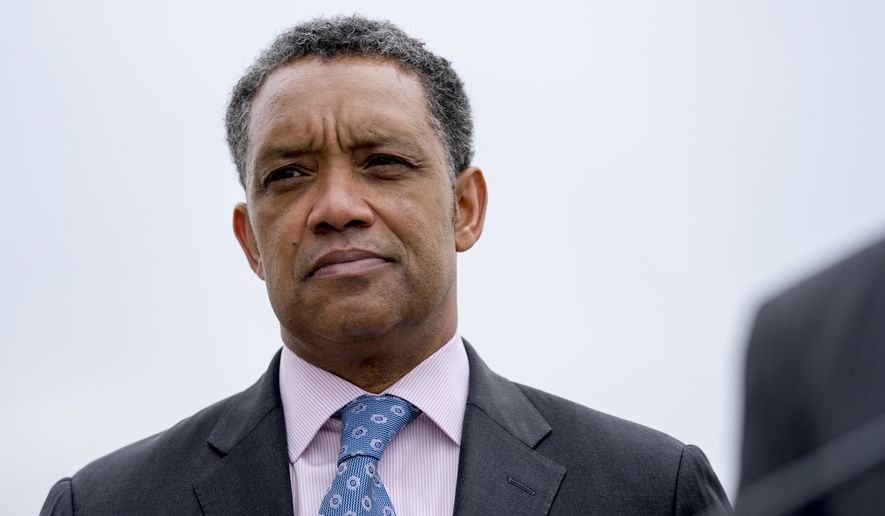For three years, former New York Attorney General Eric Schneiderman’s dream of nailing ExxonMobil for “climate fraud” has been stuck in neutral, but now the District is preparing to step on the gas.
D.C. Attorney General Karl A. Racine has solicited private legal counsel to work on an investigation — and potential litigation — against the world’s largest oil company on a contingency-fee basis. The request for bids ends Friday.
Despite its research, “Exxon has failed to inform consumers about the effects of its fossil fuel products on climate change,” said the solicitation. “Exxon has also engaged or funded efforts to mislead DC consumers and others about the potential impacts of climate change.”
Mr. Racine’s decision to pursue the climate-fraud strategy caught industry onlookers by surprise, given the decline of the coalition of 17 liberal attorneys general known as AGs United for Clean Power, unveiled amid much fanfare at a March 2016 event with former Vice President Al Gore.
So far only one state — New York — has filed a lawsuit. Massachusetts has been mired for years in a legal fight with Exxon over documents. The Virgin Islands attorney general retreated early on from his attempt to subpoena documents from the Competitive Enterprise Institute.
Mr. Schneiderman himself no longer leads the coalition after resigning his office abruptly last year over allegations of physically abusing four women. If other states investigated Exxon behind the scenes, they have yet to result in legal action.
“The timing is bizarre,” said Spencer Walrath, research director of Energy in Depth, a project of the Independent Petroleum Association of America.
Why now? So far Mr. Racine has offered no public insight into his decision-making, but as one of the AGs United for Clean Power — made up of 16 Democrats and one independent — he has supported the Massachusetts and New York investigations.
In 2016, he joined an amicus brief in support of Massachusetts Attorney General Maura Healey’s investigation. He also signed a 2017 letter objecting to congressional subpoenas against the New York and Massachusetts prosecutors.
“Passionate about protecting our environment? Join our team!” Mr. Racine wrote in a March 15 tweet. “Our office is seeking outside legal counsel to support OAG’s climate change work.”
Passionate about protecting our environment? Join our team!
— AG Karl A. Racine (@AGKarlRacine) March 15, 2019
Our office is seeking outside legal counsel to support OAG’s climate change work: https://t.co/ZMZpEdcEuk
Chris Horner, senior fellow at the Competitive Enterprise Institute, pointed out that the District’s Attorney General’s Office hired Sarah Kogel-Smucker last year as a “special assistant attorney general” paid for by the Bloomberg-funded State Energy & Environmental Impact Center at New York University, which places lawyers with state prosecutors to assist in “promoting clean energy.”
“A year later, one of the big reasons for bringing her on bears fruit: [the] DC OAG decides to hire an outside, plaintiffs’ firm to escalate the shakedown,” said Mr. Horner in an email.
A spokesman for the District’s Attorney General’s Office had no comment about a timetable. Under the solicitation, two lawyers and one paralegal would be contracted on a contingency basis, meaning they would be paid only if their work resulted in a monetary award, which Mr. Horner described as “unusual.”
Also drawing attention is a clause in the solicitation that says the contractor “may assign to a bank, trust company, or other financing institution funds due or to become due as a result of the performance of this contract.”
“In other words, a third party — like a hedge fund — can finance the contractor’s work in this investigation, allowing that entity rights to any winnings from the case,” said Mr. Walrath in a March 20 post. “The arrangement raises the possibility that wealthy entities or individuals supportive of the investigations against ExxonMobil, including the Rockefeller family, could directly fund and even profit from any eventual litigation.”
He cited comments by the Cato Institute’s Andrew Grossman in the Daily Caller, who said the arrangement “gives a whole new meaning to ’policing for profit.’”
As climate litigation goes, the focus has shifted in the last year to lawsuits filed by municipalities and one state — Rhode Island — against major oil-and-gas companies seeking billions for climate-related mitigation efforts to infrastructure.
“Those costs involve building sea walls, implementing public-health programs, and taking other resiliency measures to protect the public and municipal property from rising sea levels, increased heat and precipitation, more frequent extreme weather, and other threats,” said the New York City appeal.
That legal avenue has its own potholes. Last year, federal judges threw out the public-nuisance lawsuits filed by New York City, San Francisco and Oakland, ruling that the climate-change debate should be resolved by the legislative and not judicial branch.
Both Oakland and San Francisco filed an appeal earlier this month with the 9th U.S. Circuit Court of Appeals, while New York City has filed an appeal in the 2nd Circuit.
Also gaining support from activists is litigation filed by children against federal and state governments demanding action on climate change. So far nine children’s lawsuits have been filed, and three of the state-level cases have been dismissed, according to InsideClimate News.
• Valerie Richardson can be reached at vrichardson@washingtontimes.com.




Please read our comment policy before commenting.